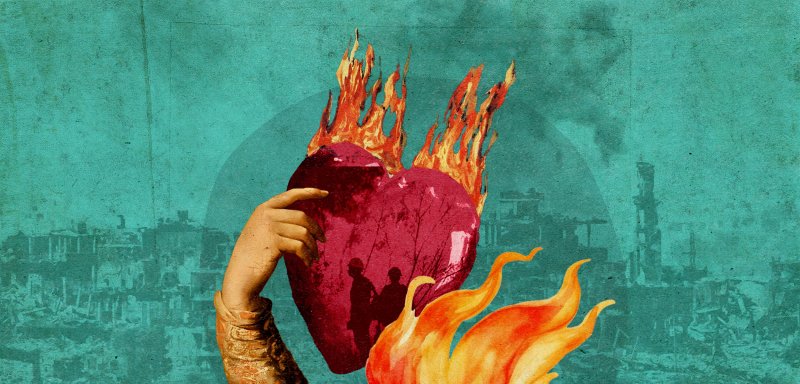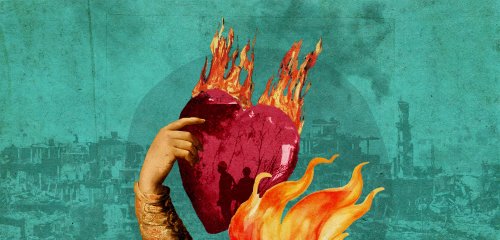While I sit here amid the wreckage of Gaza, surrounded by the relentless sound of explosions, all I can do is curse the world and resent my existence, which has become like that of a germ.
I wake up embittered by everything happening and begin my day with a brutal routine of pain and hardship. When I think about what has happened to me, to us, I feel as though life itself has betrayed me, leaving me lying in a pool of my own blood and consumed by the grim thoughts I harbor about this world. I no longer trust life, nor do I find it palatable. It feels as if I carry a stone in the left side of my chest, not a heart.
Like everyone else, I watched the fires in Los Angeles. I saw the burnt and suffocated bodies—both human and animal—and was stunned by the vast swathes of land consumed by the flames.
I was sitting with friends at a café when I first saw the fires, with the routine sounds of explosions echoing in the distance. Everyone began discussing the events, but I was overwhelmed by a wave of shock and knew I needed a bit of silence to sort out my emotions.
Those who gloat confuse the actions of the US government with its citizens—citizens who might very well be friends or relatives of anyone reading these words.
In the scenes of the Los Angeles fires, I saw a shared sorrow between Gaza and America. I saw how humans, in moments of disaster, appear helpless, fragile, and easily broken—like the hinge of a clothespin.
I heard many around me at the café, including my friends, gloating over the victims, calling it karma. They believed what was happening was divine punishment, reasoning that America is to blame for everything that is happening in Gaza.
But those who gloat confuse the actions of the US government with its citizens—citizens who might very well be friends or relatives of anyone reading these words.
Taking a moment for humanity
Yes, even at the height of my disgust with the world and my awareness of the immense injustice inflicted on Gaza, I felt sorrow for the victims of the US fires. Watching those homes burn brought back memories of the fires in Jabalia, Rafah, and Gaza—of the bodies strewn across roads that reminded me of what is now known as the “road of corpses,” Gaza’s al-Rasheed Street, a road where Israeli soldiers incited terror and genocide against Palestinians.
Two catastrophes: one man-made, the other wrought by nature. Yet what unites them is the suffering of humans and their inability to stop the fire from consuming them.
When should I grieve for others? Is there any value in the concept of global compassion and shared mourning? And where should a Palestinian, in the midst of a genocide, stand to play a piano melody of peace and empathy, while surrounded by tons of dynamite?
I don’t believe in the connections people draw between reward, punishment, and divine vengeance, but I do believe we are always faced with an uncertain fate. Disasters will persist in our world—perhaps shifting away for a moment, just long enough for us to cross the road.
I see in these overwhelming tragedies and miseries that afflict humanity—in Gaza and anywhere else in the world—an opportunity to reconsider the meaning of humanity, the importance of sharing or refraining from sharing pain, the significance of shared grief, and the moments when I, too, should mourn for others.
When should I grieve for others? Is there any value in the concept of global compassion and shared mourning? And where should a Palestinian, in the midst of a genocide, stand to play a piano melody of peace and empathy, while surrounded by tons of dynamite?
The real weight of indescribable pain
I closely observed the global empathy for the victims of the US fires: I saw the panic, sorrow, tears, and the rapid institutional response to provide support to the victims and survivors, and I swear, if humanity had offered even a quarter of what it had provided to America’s victims to the victims of Gaza, the war would have ended in its first month.
Do we not have the same emotions? Are we not the same human beings? Why was Gaza thrown into a pit, and everyone took part in burying our people inside?
I won’t hide it from you—I feel the hands that extend to the US victims to cool the flames around them. I count them in astonishment, and I feel deep sorrow.
When comparing how the two catastrophes were handled, we are confronted with a grim reality: a humanity divided according to standards crafted by the powerful, in line with their interests. It feels as though the weight of pain depends on its geographic location, much like Google calculates the monetary value of a click on an ad. It’s disheartening that American pain weighs more than Gazan pain. Without impartiality, everyone plays a part in maintaining this skewed balance.
We cannot overlook that global issues are controlled by the powerful through manipulative media tools that steer societies to serve their agendas and interests. Still, I think of the possibility that there may be a person suffering from this natural disaster in America right now who, even for a moment, felt compassion for the people of Gaza.
It feels as though the weight of pain depends on its geographic location, much like Google calculates the monetary value of a click on an ad.
I fully understand how the stories of Gaza’s victims pass like mere numbers, or like boxes without labels, writings left unopened to discover their contents—carelessly dragged to forgotten warehouses. The emotions and screams of Gaza’s victims were never released to the world. They passed as ants crawl in the dark, unnoticed, unlike the carefully crafted stories of the American victims. Those stories are written by experts skilled in stirring human sentiment to rally global empathy, just as emotions were rallied to generate sympathy for the Israeli hostages in Gaza. This difference in narrative and how something is presented is dictated by the will of the powerful.
Gloaters are not monsters
My friends criticized me when I shared my thoughts: I’m not gloating over the US wildfires. I sympathize with the victims of the fires and react the same way I do for my relatives, friends, or neighbors in Gaza, whose bodies were burned by the human hand of war. But at the same time, I do not attack those in Gaza who gloat over what’s happening in America. I cannot do that, and I urge those who criticize the gloaters to come and live even half of our experience before passing judgment.
I won’t hide it from you—I feel the hands that extend to the US victims to cool the flames around them. I count them in astonishment, and I feel deep sorrow.
I cannot prevent or regulate people’s anger and despair, just as I cannot strip humanity from someone who faces the constant threat of turning into a corpse to be devoured by dogs, birds, and cats within days.
It is impossible to convince someone who has endured repeated man-made hells of the value of humanity. Often, I find myself thinking that the feelings and emotions of the people of Gaza have become relics, fit to be displayed in a museum. How, then, can I blame those who are trying to express their pent-up anger in their own way?
I cannot label those who gloat over America’s tragedies as monsters, nor can I condemn them. Their feelings reflect the essence of being human, as humans are vessels of emotions and desires, capable of giving back only what they receive. Demanding noble emotions in such circumstances often feels like a bitter joke.
The conversation at the table grew louder among my friends. The debate intensified until we could no longer hear one another. Most of those present were angry, refusing to accept my perspective. At that moment, I felt that empathy for America’s victims was a luxury that few in Gaza could afford.
Gaza has been uprooted by the hands of monsters, shaken to its core before the eyes of all, and reduced to a political issue. Meanwhile, the fires in America were deemed a humanitarian catastrophe, demanding tender emotions and reverence for human life.
Humanity as a distorted symphony
The clash of ideas and conflicting emotions pushes us to redefine humanity. Personal pain is a subjective matter, while collective pain has been shaped by universal values and traditions. Yet, when these values are applied, they come with double standards.
Gaza has been uprooted by the hands of monsters, shaken to its core before the eyes of all, and reduced to a political issue. Meanwhile, the fires in America were deemed a humanitarian catastrophe, demanding tender emotions and reverence for human life. This irony is not something to applaud—it’s a grand deception that strips meaning from everything we endure. Personally, I have stepped away from playing a role in this tiresome charade.
Attempting to understand humanity through such flaws reveals the thorny complexities of globalization and exposes the fragility of our humanity. The systems that promised to bridge divides between peoples and eliminate the differences between them have instead created worlds of classes, and granted some the right to narrate their stories while denying others that same right, or distorted their narratives, leaving them alone at the bottom of the well.
My friends criticized me when I said I’m not gloating over the US wildfires. At that moment, I felt that empathy for America’s victims was a luxury that few in Gaza could afford.
Milan Kundera views humanity as a musical symphony riddled with imbalance and distortions, and I believe everyone experiences this music. It passes through our ears, and it’s inconceivable to let it go without attempting to discern the errors and adjust the melody. The continued act of dividing humanity based on power and politics will render noble emotions and human empathy a lie shared by everyone. With time, human stories will lose their narrative power and their ability to touch and move us.
*The views and opinions expressed in Opinion and Blog articles are those of the author’s, and do not necessarily reflect the official policy or position of Raseef22
Raseef22 is a not for profit entity. Our focus is on quality journalism. Every contribution to the NasRaseef membership goes directly towards journalism production. We stand independent, not accepting corporate sponsorships, sponsored content or political funding.
Support our mission to keep Raseef22 available to all readers by clicking here!
Interested in writing with us? Check our pitch process here!






